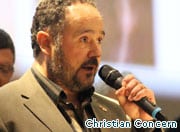A street preacher has been told by a judge which Bible verse he should have used when discussing homosexuality, as he was convicted of a public order offence at Bristol Crown Court.
Michael Overd was represented by the Christian Legal Centre. It said the freedom to proclaim the gospel of Jesus Christ in a loving way should be ‘defended to the hilt’.
The National Secular Society has also spoken out about the case, raising concerns about free speech being curbed.
Fined
Overd, who was cleared of two other public order charges, was fined £200 and ordered to pay £1,200 costs. He is said to be considering an appeal.
A regular preacher in Taunton, Overd was on trial for two incidents that took place in June and July last year.
In court Judge Shamim Qureshi told Overd that he should have used Leviticus 18 instead of Leviticus 20 to make a point about homosexuality, the Christian Legal Centre said.
Dictate
Overd commented: “I am amazed that the Judge sees it as his role to dictate which parts of the Bible can and can’t be preached.
“This is not free speech but censorship. The Judge is redacting the Bible”, he added.
He said: “My motivation for preaching the gospel is my love for Jesus Christ and my deep concern for people who do not know His great love and are heading towards an eternity separated from God.”
Love
Andrea Williams, Chief Executive of the Christian Legal Centre, said Overd is “clear that he is motivated by love, not hate. Indeed, this is in line with the message of the Bible”.
Williams added: “There will always be those who disagree with the Bible’s teaching. But we should defend to the hilt the freedom to proclaim it in a loving way, which is what Mike Overd always seeks to do.”
The National Secular Society’s President, Terry Sanderson, noted the ‘high principle’ of free speech at stake.
“As long as there is no incitement to violence, then people should be allowed to speak freely without fearing legal repercussions”, he said.

